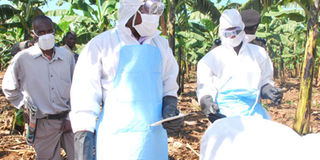One case of Ebola confirmed in Uganda

A file of doctors taking blood samples from suspected ebola patients in Lyantonde in 2012
A five-year-old boy is being treated for Ebola in Uganda, the first case since an outbreak in neighbouring Democratic Republic of Congo 10 months ago, Health Minister Dr Jane Ruth Aceng has said.
"The confirmed case is a 5-year-old Congolese child who traveled from the DRC with his family on 9th June 2019. The child and his family entered the country through Bwera Border post and sought medical care," Aceng said in a press conference at 9:00pm on Tuesday.
Aceng says the Ministry of health and World Health Organisation have sent a team to Kasese District to trace likely cases and vaccinate those who may have come into contact with the patient.
Uganda has been on high alert since the outbreak in the eastern DRC, where more than 2,000 cases of the highly contagious virus have been recorded, two-thirds of which have been fatal.
Dr Aceng said, a total of eight people including the mother of the deceased and other relatives suspected to have been in contact with the victim have been taken to the isolation facility at Bwera Hospital. The Congolese medical personnel had alerted their counterparts in Uganda to trace the family members who had crossed to Kasese with their daughter who is married to a Ugandan.
“All the other Congolese family members have been identified and are in isolation at Bwera Hospital. Two of them had their samples removed when they developed symptoms similar to those of Ebola. Samples are on the way to UVRI and results will be communicated tomorrow (Wednesday),” she said.
They are said to have escaped from health personnel in DRC after the burial of their relative, an Ebola victim.
Dr Aceng said the Ministry was alerted by the officials in DRC who sought for a cross border meeting to find means of controlling the movement of people who have had contact with Ebola victims.
Dr Aceng said that on arrival into Uganda, the family realised that the boy was sick and they rushed him to Kagando Hospital more than 20kms from the border.
It is at Kagando Hospital that the medics detected the boy had Ebola symptoms, drew samples and sent them to UVRI. The boy was immediately transferred to the only isolation centre in the district at Bwera Hospital.
Dr Aceng revealed that a joint team of experts from Ministry of Health, World Health Organisation (WHO) and Centre for Disease Control has been dispatched to Kasese to assess the situation and intensify surveillance of the disease.
She said the boy is already being given treatment but would immediately be enrolled on therapical treatment as soon as WHO delivers supplies.
Asked how, the Ugandan government is set to contain the outbreak in the wake of the porous border with DRC; the Minister said the borders will remain open as the two countries intensify their collaboration in screening people who cross.
“We cannot stop movements of people. They will continue because we have to take note that the population in Kasese has relatives in DRC. We only need to continue with our screening” She said.
She said the government of Uganda has been ready in the almost 10 months of the Ebola outbreak in neighbouring DRC and will contain it before spreading in the population. A toll free number 0800203033 has been announced for people to report suspected Ebola patients.
The Ministry of Health established screening centres at all the crossing points between Uganda and DRC. At least 35,000 people cross into Uganda on market days.
The Ministry also revealed that samples taken from a 13- year-old girl in Pakwach, West Nile, who was suspected to be having Ebola after crossing from DRC have tested negative.
The news about Ebola outbreak in Kasese District came on the same day the Rwenzururu Kingdom confirmed the death of Queen mother Christine Mukirania. She died at 85 on Tuesday.
Background
At least 2,000 cases involving 1,357 deaths have been recorded in the DRC's North Kivu and Ituri provinces since the epidemic started in May last year, according to the WHO
There were several rumours of the disease outbreak in Uganda especially in the border districts of Kasese and Hoima which government has always come out to refute.
Other most at risk districts include Kabarole, Bunyangabu, Bundibugyo and Ntoroko.
As such, government together with WHO laid various strategies to prevent the spread of the disease especially in districts that are neighboring the heamorrhagic stricken country.
Among others, government through ministry of Health reactivated surveillance teams and task forces at Uganda’s different border points with Congo to control movements and conduct screening for those entering the country.
Also for the very first time, government in November last year started vaccination against the deadly Ebola haemorrhagic fever (EHF)
The Ebola virus belongs to the Filoviridae family (filovirus) and is comprised of five distinct species: Zaïre, Sudan, Côte d’Ivoire, Bundibugyo and Reston. According to the World Health Organisation, Ebola virus is transmitted by direct contact with the blood, secretions, organs or other body fluids of infected persons.



